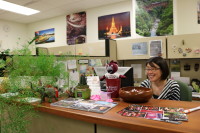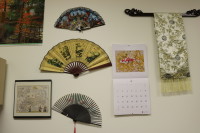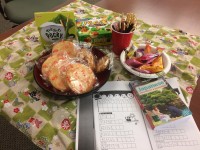
By ADELINE TAO
Behind a collection of colorful information cards and knickknacks sits Izumi Osawa-Minevich at her desk at Ramapo College’s Roukema Center for International Education. A green plant with long thin branches like hair is dotted with tiny leaves, and it shields her as she types away at her computer. She is answering emails from tons of students while simultaneously trying to go over important immigration documents for international students.

Izumi Osawa-Minevich is a Program Assistant for the school’s study abroad office. She helps all students achieve their study abroad dreams along with the rest of the office. What makes Osawa-Minevich special is that she once studied abroad herself. Once upon a time, she was an international student from Japan, and today she is living in the U.S. and dedicates her life to international education.
Osawa-Minevich is an immigrant from Fukushima, Japan. She was born and raised in Japan, and from an early age she already knew she wanted to study abroad. For college, she attended an international school where she studied International Relations. In 2002, she was finally able to come study abroad in the U.S. The school she chose to study at was the University of Pennsylvania, where she took Political Science and International Studies courses.
“Growing up in Japan, I was always thinking that I would be moving and living abroad,” said Osawa-Minevich. “I guess any country would have been possible, but I wanted human connection. And I got it here, academically and personally.”
[AUDIO: Listen to Izumi Osawa-Minevich talk about why she chose her study abroad program]
“From my elementary school years, actually, even that, I remember writing in my yearbook for my elementary school graduation, that I would be studying abroad. So that was always my goal.”
Here at Ramapo, Osawa-Minevich’s goal is to promote international education. This area has become an important segment of the college, and is also important on a global scale.
Students who study abroad are proven to be better off after graduation. According to the study conducted by IES Study Abroad entitled “The Impact of Studying Abroad on Recent College Graduates’ Careers,” 94% of students who had studied abroad in the undergraduate years found a job within 12 months of graduation. Moreover, 44% of that group found a job while they were still in college. Additionally, 90% of study abroad alumni got into their first or second choice graduate school.
Study abroad also helped students once they were out of college and into the workforce. 85% of students who felt that experience helped them “build valuable skills for the job market.” Then in another study done by the American Institute for Foreign Study, researchers found that 80% of students said that “studying abroad contributed to [their] ability to adapt in diverse workplace environments.” Along with that, 68% of students also said that “studying abroad contributed to developing [their] ability to understand an organization’s culture.”
Osawa-Minevich is a part of the movement to increase study abroad experiences around the world. She knows the significance of it, and all of the benefits that come along with it. Ramapo College has echoed this rising trend in students studying abroad, with the numbers saying it all: In 2012, 97 students had studied abroad in the past year. In 2016, 129 students had studied abroad in the past year.
“Studying abroad or being abroad definitely changed my life a lot, so I’m a big advocate for it,” she said. “And I work for the International Education office and help students to study abroad, so I push for it with all my heart.”
Studying abroad is a worthwhile life experience, according to Osawa-Minevich. However, this amazing opportunity did not come without its bumps on the road. Nevertheless, the obstacles that international students face is actually what contributes the most to self-growth.
Adjusting in America
For Osawa-Minevich, the actual key reason for her officially moving to America after her year studying abroad was that she met her husband here. “During my study abroad year, I met my husband-to-be. We lived on the same floor and we got to know each other through activities between the domestic students and international students,” she said. “We got married, so of course I had to stay.”

As life changing as that love story was, Osawa-Minevich had to leave her home in Japan behind. This includes all of her friends and family behind in Japan, but they were all very supportive of her decision. “They probably predicted I was going to be living abroad anyway,” she added.
Japan and America are two vastly different countries in many ways. From the people, the food and the overall culture – figuring out how to live in the U.S. is a challenge for any immigrant. For Osawa-Minevich, she said, “I guess I had to try a bit harder to push myself to speak up, be clear about my opinion and to be not too polite communicating with others to be understood.”
“I do miss Japan,” said Osawa-Minevich. “Like my friends, the food, being punctual and cleanliness.
“I’m a nature person so springtime actually is when I miss Japan the most. And spring is right around now,” she continued. “Cherry blossoms come up and that’s the time people gather and it’s so pretty there. So that’s the time I get homesick a little bit.”
Luckily, Osawa-Minevich’s experience adjusting in America was actually more positive than difficult: “The first thing that came to mind about my adjustment here is that I didn’t have to adjust too much.” She continued, “You can be who you are and you would be accepted as is in America – ideally. And that’s what I like about this country.”
Sandy Aung is a sophomore at Ramapo College, and is an international student from Burma. “You learn beyond what you were taught in class,” said Aung. “International education is not just traveling abroad to take classes. By stepping out from a familiar place, you’re challenging yourself to unknown levels.
“It’s not just a physical journey but a journey of self-discovery,” she continued. “You’ll be surprised at what you are capable of in a completely unfamiliar territory – you have to roll with the punches.”
Being dubbed the “melting pot of cultures,” it is no wonder that so many foreigners find themselves immigrating to the U.S. According to asiamattersforamerica.org, 32 percent of Japanese Americans over the age of 18 were born outside of the U.S. Moreover, according to pewsocialtrends.org, 74 percent of all Asian Americans adults are born outside of the country as well.
At this moment in time, Osawa-Minevich has created a great life here for 14 years with her husband and daughter, and Sandy Aung is a successful student at Ramapo College.
International Education Initiative
Working at the Roukema Center is the perfect job for Osawa-Minevich. Her main job is to help students see their study abroad dreams come true. She works with the other Program Advisors in the office to encourage students to go abroad, and to help them complete their applications.
The main goal of the Roukema Center is to promote international education. This is something Osawa-Minevich can connect to, being an international student herself at one point. And since she is from Japan, Osawa-Minevich uses her own personal skills to promote Japanese international education through the Language Happy Hour that she hosts.
Language Happy Hours are informal language classes where Ramapo students can learn languages that are not being currently taught in an official class. These languages include Hindi, Portuguese, German, French – and of course, Japanese.
Osawa-Minevich’s Japanese Language Happy Hour occurs every week on Wednesday from 2:00 p.m. to 3:00 p.m. in ASB-230. Students of any year and language proficiency level are welcome, and come to enjoy her lessons.
Lessons are not only focused on learning the Japanese language, however. Osawa-Minevich also incorporates subjects of Japanese culture, like holidays, traditions and – most popularly – food.

“I like to talk about culture and food and music and all these things, so I try to include all these things together.” said Osawa-Minevich. “And then at the same time, the basic core of the purpose of these meetings is the language learning part that I try to put in subtly, in a casual more friendlier way.”
She gestured to the large array of cultural Japanese snacks that she brings to the Happy Hour every time. “Snacks, I think, are the big pull first of all. And then I try to get the things that you can get in Japan, that’s like a popular food.”
Even though the Happy Hour room is a large, conference-style room, students gather near the front to be closer together. Izumi is in the center of the group, and all eyes are pointed toward her as she begins her lesson. Sometimes, a hand sneaks to the pile of colorful snacks beside her – filled with candies, biscuits and chips.
Japanese Language Happy Hour is a huge hit at the Roukema Center. According to Osawa-Minevich, they are the most popular language happy hour, attracting almost 15 students at a time.
“Anything international could actually ignite the whole passion for studying abroad. You raise interest for students to go learn other languages, so that leads to the study abroad experience. Or you can reach out to international students and make friends and learn about other cultures,” said Osawa-Minevich. “So to create the culture in Ramapo for the international environment, and diversity, that’s our goal, that’s what I do.”
[VIDEO: Watch the World Expo event Izumi Osawa-Minevich and the Roukema Center hosted at Ramapo College]
Aung, as a current international student herself, understands the unparalleled and unique value of studying abroad. “I’ve always wanted to study abroad because honestly, I can’t get a decent job in my country with a degree from my country,” she said. “The only outlet to a prosperous future is to get out of there and move to a place with better opportunities.”
Students like Aung are exactly who Osawa-Minevich tries to foster. “Definitely definitely, my basic stance is that you should be exposing yourself that’s a great chance to discover yourself as well, not just to discover other cultures,” she said.
“That’s what I got the most out of it like when I was studying abroad, even if it was just for one year. I learned a lot about myself, and that actually changed my life plan and the course of the whole choices that I made until this point. And probably for the future too. That was like a backbone of my coming of age experience.”
Her life in America has proved fruitful, and coming here from Japan is a decision she will not regret. Osawa-Minevich is hopeful for the future of international education blossoming around the world.
I really like how you gave the point of view of someone who works in the Roukema Center and has so much experience with international studies in her own life, as well as through her career. She is obviously so passionate about what she does and her story is fascinating. I also liked that you included the point of view of an international student who is studying here as well. This was a really well put together story with no holes or irrelevant information. The language happy hours sound really interesting and it’s great that your story gives the reader something to look into and try out. Personally, there isn’t much more I’d want to know about but I’d be interested in attending a language happy hour next semester.